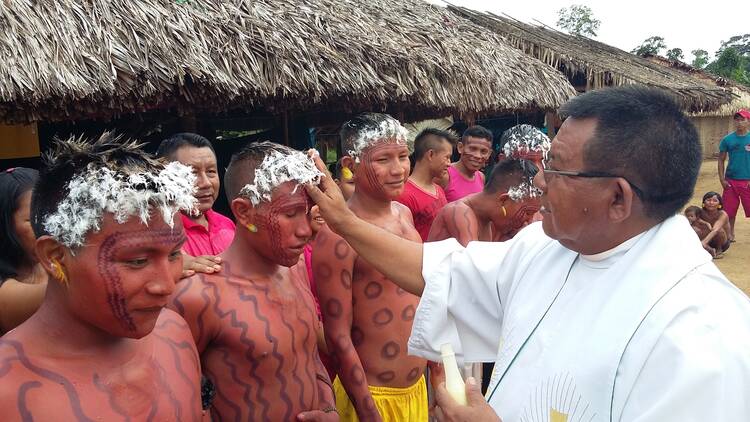Joaquim Magalhães de Castro
Professor Mario Polia, an anthropologist, historian of religions, and a profound connoisseur of Andean cultures, recently published a collection of oral histories gathered by Father Mario Lanciotti, a Xaverian missionary active in Brazil in the 1960s and a former missionary in China and Japan. This now sheds new light on missionary testimony among the peoples of the Amazon.
The work brings together myths, tales, legends, and cosmogonic narratives passed down orally for generations by the indigenous peoples of the Amazon. Hearing directly from the faithful of his missions, Father Lanciotti spent long nights in the villages, often under the moonlight, to the sound of crickets and nocturnal frogs. This activity was not a hobby for him: he considered it indispensable to his missionary work. He always made an effort to understand the people of the places he was sent to and helped them according to their capabilities, trying to “love and accept them” as they were, “avoiding noise and paternalism,” as he so aptly put it in one of his testimonies.
In compiling these oral traditions, Father Lanciotti knew they certainly needed to be overcome. As he himself put it, “old superstitions remain in the deepest layers of the soul, like posters pasted one over the other: when the first one is torn down, the previous one reappears.”
Lanciotti’s great wisdom was understanding that, to evangelize, one must first understand the other’s way of thinking. His compilation of testimonies is an act of respect and listening.
“I spent long periods in the Xingu River region, on the border between the lands occupied by white people and the forests where indigenous tribes still live,” Father Lanciotti commented in another account. “I spent many afternoons with the ‘civilized’ Indians. We would sit on the grass in the moonlight, while crickets, frogs, and nocturnal birds accompanied us. After Sunday school, I encouraged my indigenous interlocutors to tell me stories of the jungle and mythological events passed down through the centuries.”
Father Mario Lanciotti (1901-1983) was a native of Cupra Marittima (Ascoli Piceno, Italy). Coming from the Fano Seminary, where he completed his Third Degree in Theology, he arrived in Parma on July 15, 1925. Ordained a priest two years later by Bishop Conforti in the Cathedral of Parma, he went to China in 1928, where he was denounced until December 1946, undergoing the ordeal of restricted residence and even detention. In China, he was known as the “bicycle priest,” as this was the means of transportation, he used to travel to every corner of the territory entrusted to him. From Pei-chan-Kecu, in 1937, he wrote the following: “Three years ago, there wasn’t a single baptism here… How I suffered! But now it’s Christmas. Thank you, Lord, for calling me among these people!” His small church, in a cave carved into the mountain, was filled with Christians.
Returning to Italy after a brief period of rest, in 1947 he was assigned to Parma and then to Piacenza as spiritual director of theologians. In 1950, he dedicated himself to missionary work in several seminaries. A year later, he left for Japan: adventures in Kishiwada and Nobeoka until 1955, when he was assigned to Brazil. He worked in the south of that country until 1960 and, with the opening of the Abaeté Prelacy of Tocantins, he moved north (to Pará). He served in Tomé Acú, Abaetetuba, Belém, and finally, in 1975, he asked to help the Xingu Prelacy, which was short of staff.
Already over 70 years old, Father Lanciotti was one of the first Xaverians to send to the remote regions of the Xinguí Prelacy. In 1976, from Altamira, he wrote: “I am already old. I have lived my life. But I assure you that I am happy, very happy with my missionary life. If the Lord gave me the chance to begin again, I would not hesitate to begin again in the same way, with a few adjustments.”
His life is reflected in his writings. He wrote extensively—not books, but many articles and stories about missionary life. He possessed a keen sense of observation and was able to capture relevant thoughts, observe characteristic customs, and even judge the most diverse situations he encountered. His style was simple and pleasant. Even with the pen, he wanted to say “something useful to everyone.” And in his writings, he left his message: “I am here,” he wrote to a friend, “in the middle of the Amazon rainforest, on the banks of the Xingu River. I am happy. When I got a job in this abandoned place, I was 71 years old, but now I feel like I’ve lost 40. Here, I feel more at home as a missionary. The Lord has been very good to me in my old age! How I must endure the painful missionary life! If you want to be happy, come with me!”
Serious eye problems affected him. He then asked to live among the elderly in a nursing home in Belém, becoming “poor among the poor.” Hospitalized for surgery, he was unable to recover due to post-operative complications, dying on January 22, 1983. His funeral was attended by four bishops, many priests, and the faithful who loved him dearly.
Father Mario Lanciotti, a Missionary of the Lord for nearly fifty years, now rests on the banks of the Amazon River. His life was entirely dedicated to the mission, tirelessly and always in the most difficult and disadvantaged places.


 Follow
Follow


